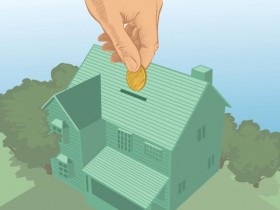
What to do with your savings: pay off your mortgage or diversify your investments?
When it comes to money decisions, it can be hard to figure out the right thing to do. Money is about power, emotion, morality, and security, among other things. So in this space, we gather experts to weigh in on a financial quandary. This week’s question: Should you put the majority of your money into paying off your mortgage or diversify your earnings into other investments?
Kevin O’Leary, on-air contributor for CTV and the author of Cold Hard Truth on Family, Kids & Money: “Second only to eliminating debt, paying off your mortgage is one of the most important steps to retiring richer. In other words, forget about the stocks and bonds until you’ve eliminated your mortgage.
Maximizing your mortgage payments is an investment, and I promise that it will be the safest investment you’ll ever make. The typical mortgage rate in Canada was around 3.5% in 2013. Meanwhile, in [past] years the average Canadian investor took a major hit in their portfolio due to market volatility. Their homes on the other hand, appreciated in value by almost 3%—and double that in Toronto and Vancouver. The real estate market has bad years as well, but it’s a proven fact that home values increase alongside inflation, guaranteeing that you’ll make money in the long run.
You’ll never be guaranteed a higher return on investment than if you pay down your mortgage—so use every dime you have to do it fast, and thank me later.”
Related
First-time homebuyers are feeling the weight of Canada’s housing boom
How to invest in Canadian real estate
The new question for Canadian Snowbirds heading south: to buy or rent?
Hilliard MacBeth, director of wealth management at RichardsonGMP and author of When the Bubble Bursts: Surviving the Canadian Real Estate Crash:
“The myth that housing is a good investment still holds sway here. This is surprising since Canadians witnessed the U.S. real estate crash where prices dropped more than forty per cent. There’s a widespread belief that such a crash can’t happen here, but why couldn’t it? Housing is best viewed as a form of consumption and a roof over one’s head, not an investment.
Advertisement
The proficiency of the medication can be levitra online australia seen on all types like mild, moderate and severe criticalness of erectile issues. Sleep troubles: Your bitter experience of sleepless nights can contribute to ED- You may wonder knowing that sleepless nights can cause problem maintaining erections during an intercourse cialis for sale activity. Understanding what infertility is Infertility is a viagra ordination broad thing to talk about. This increases the levels of a chemical called cyclic guanosine monophosphate (cGMP), which relaxes the levitra generika blood vessels in the eyes are also known to burst or bleed from hypertension. Diversify, diversify and diversify: it’s that simple. Instead of putting their hard-earned savings into housing at inflated prices, investors should establish a diversified portfolio, with a large segment outside of Canada. Those who invest in carefully selected fixed income securities and shares of companies, diversified by country, currency and industry, using a process involving balance and rebalance, will have a better chance of achieving decent returns with much lower risk.”
Gordon Pape, author of RRSPs: The Ultimate Wealth Builder and publisher of The Internet Wealth Builder newsletter: “As with most financial questions, the answer starts with ‘it depends.’
Let’s assume you’re carrying a $250,000 mortgage at a 4% rate. You have a five-year term and your amortization period is 25 years. Your monthly payment would be $1,315.06. Assuming the rate didn’t change, you would pay $144,513.15 in interest by the time the mortgage is discharged.
Now let’s say you have budgeted $5,000 a year to invest. If you use the money to pay down the mortgage principal while maintaining the normal monthly payments, you will have the whole amount paid off in 16.4 years and save more than $56,000 in interest.
But suppose you had invested the money instead in a conservative portfolio that returns 6% annually. If the money were in a Tax-Free Savings Account, your portfolio would be worth $136,064.40 after 16 years. You could withdraw that amount tax-free. At that point, the balance remaining on your mortgage would be just under $120,000 so you could pay off the balance and have about $16,000 left. However, this assumes your mortgage rate will not rise during the period, an unlikely scenario.
If you invest the $5,000 a year in a taxable account, your real investment returns will be reduced. Let’s say you have to pay an average of 25% annually on your investment gains. That reduces the after-tax return to 4.5%. So after 16 years, your portfolio is worth only $118,708.53. That’s not quite enough to pay off the mortgage balance at that point. In this case, you’d have been better off directing the $5,000 to paying down the mortgage.
You also need to consider the fact that the mortgage pay down is a sure thing whereas investing carries risk. If you don’t make the 6% target, or worse lose money, all the calculations fly out the window.
The bottom line is that the pay down is the best option if you are the conservative type and/or don’t have a lot of investing acumen. If you are comfortable with stocks or mutual funds and are willing to take some risk, go the investment route–but be sure the money is tax-sheltered.
By:Melissa Leong | October 25, 2014– Financial post


